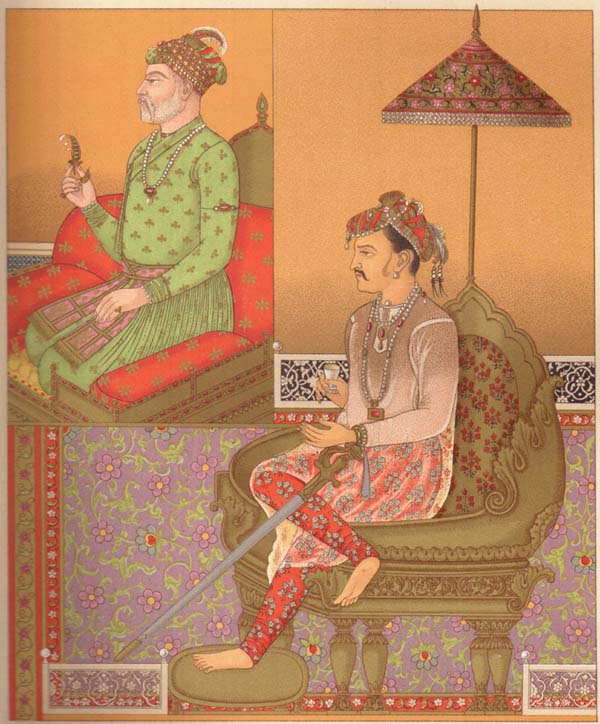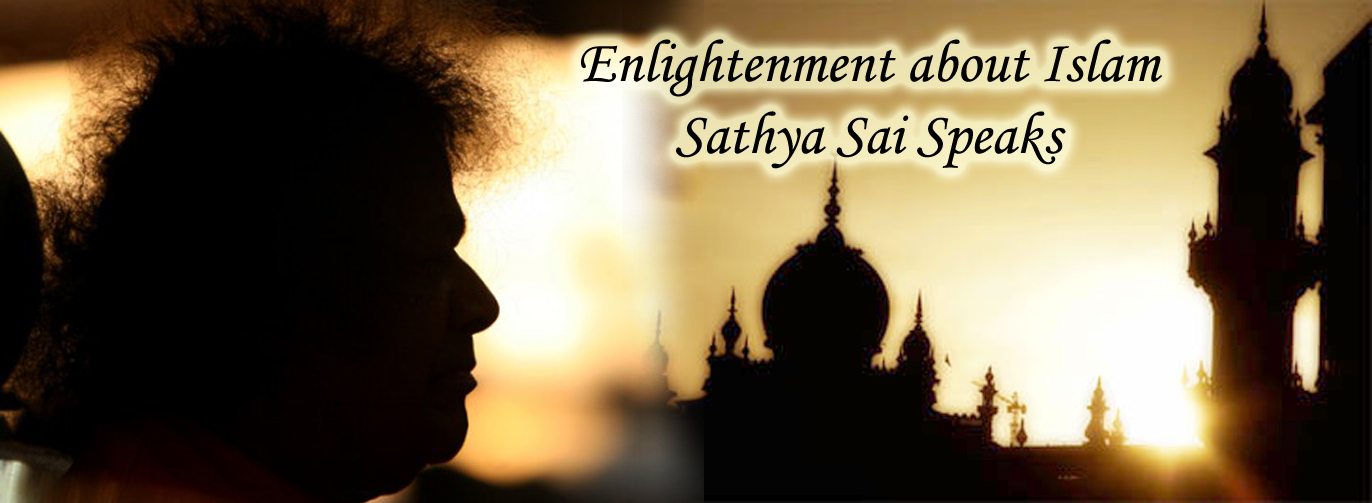 |
| The Lord speaking is a privilege that was enjoyed by Moses, Jesus and the Prophet. How lucky that we too enjoyed that rare privilege! |
Though this article can be a stand-alone piece, it would be a nice continuation to read after the first two parts entitled:
Having read those, welcome to the concluding part of that memorable interview.
A personal interview
From this point on, the interview took a very personal flavour in the sense that many boys asked Swami different things that were bothering them. Leaving out all the questions that are irrelevant here because of their very ‘personal’ nature, I shall present the ones that hold great relevance for all of us today and for all times to come as well.
Swami looked at Abhijeet and asked him,
“Boy, what is your name?”
Abhijit was simply overawed and overwhelmed that Swami spoke to him. No words seemed to be dropping out of his mouth! Somehow, he gathered his wits and replied,
“Er... Abhijeet...Sir... Abhijit Swami!”
Even as he said that, he took off the Muslim skull cap.
All of us smiled at how he had addressed Swami as if He was some military general and acted in that way too!
“Put back the cap on your head...put it on.” Swami said quite sternly. Abhijit wore the cap back on his head. Swami then asked him,
“What is the meaning of Abhijeet?”
“I don’t know Swami.”
I knelt up and Swami looked at me. “Swami, Abhi stands for Abhimaanam (body-attachment or ego). Jit is to win over. A person who has won over body attachment is Abhijit.”
As I completed saying this, Swami looked at me. He bore deep into my eyes and I was lost in His eyes. A smile played on HIs lips. I wished that moment could be frozen for eternity. The flow of love was so palpable that I placed my hands on His knees very gently. Then, I began to massage His calves and feet. He did not protest. I was so happy.
 |
| Jahpanah Akbar hopefully passed on to his son what hisfather had told him! |
Akbar-Humayun conversation
“Where did you get that from?”
“Swami, this is from our costumes department...” said the warden.
“Oh! You have all these in your costumes department?”
“Yes Swami! This is Akbar’s robe.” (That robe had been stitched specially for the role of Akbar in a drama staged for the Convocation 3 years before).
Swami then made some revelations,
“Akbar was a great king. His father once wrote a letter to him.”
“Humayun Swami?” I asked.
“Yes. He wrote to him telling him that it was indeed a great blessing and privilege that he had become the ruler of India. India is a land of Sheelam. Sheelam means character. To rule this SheelaBhoomi (land of character), you are indeed blessed.”
Even as Swami made this statement, His eyes became glassy, as if He was reliving something within.
Prayer and Love
Ramakrishnan asked a question that seemed very simple on the face of it. However, today when I think of it, it was a very pertinent question and holds great relevance in life. It was a question on prayer. Ramakrishnan asked,
“Swami, how should one pray?”
There was silence for a few moments. Swami then said,
“Whenever you pray, you must always do so with the feeling of ‘You and I are one’.”
Thinking about it, if prayer is done that way, none of us will ever ask for anything, complain about anything or even think about anything. Isn’t it?
Abhishek asked now,
“Swami what is pure love?”
“Pure love is possible only with God. It is possible only towards God.”
This statement immediately triggered my thoughts. I ventured to ask Him a question that had bothered me for a very long time.
“Swami, when I love anyone...”
Immediately He turned to me and was fully focused on me. encouraged, I continued,
“When I love anyone, I do good to them. But is it not basic goodness that they too do the same to me?”
“That is not love at all. That is selfishness.”
I had to agree. “Yes Swami... that is expectation.”
“It is bad”, said Swami.
“But Swami, it happens so automatically...”
“Only love happens automatically. Expectation is what you foster. One must have love and love is possible only with God, for God. Yes, to a certain extent, parents’ love is there. But ultimately, only God’s love is true.”
Power of Love rather than Love of Power
Suddenly, Swami began to cough. The cough was quite violent. A few boys offered HIm a glass of water and He declined it. Santosh told Swami,
“Swami, please take care. You are coughing a lot.”
“Ah! It is because of these regular visits to the indoor stadium. There is a lot of dust there.”
(The Sri Sathya Sai International Centre for Sports is a marvel which has hosted international basketball, volleyball and shuttle badminton matches. The surfaces there have been approved by the ITF, IBF, ITTF and IHF. Any visitor to Puttaparthi must make a visit to this stadium to understand what a magical monument it is.)
Swami continued,
“The Larsen & Toubro people asked for five years to build it. Not even three months have passed and so much of it has already come up.”
All the boys began to ‘praise’ Swami,
“Swami, this is possible only for God.”
“If not for you Swami, this would never have happened.”
“Swami’s love makes the workers toil so hard day and night.”
Swami made a very important point here which any employer or business owner should note.
“What is important is not that they are doing hard work, but they are happy doing that hard work! If you give them love, they too will give love. You know how they express their love? When I go there, they spend 2 minutes having my darshan. But then, they work for an extra four minutes to make up for it.”
As Swami explained this, I was lost wondering about the great power inherent in love. Today, instead of a craze for the power of love, there seems to be a craze for the love of power! If only we could take a few lines from the pages of His-Story, we can make the world a much better place to live in.
Since the topic was about the indoor stadium, I told Swami,
“Swami, when you come to the indoor stadium, please come to our hostel also. It stands just opposite to the stadium being constructed.”
Swami’s face seemed a little disappointed. The next statement He made was a great assurance and one filled with Divine love,
“Che Che! Why do you say, ‘just nearby’ is the hostel? Will I not come if it is far? If you call, that is enough. Distance does not matter.”
Immediately all of us chorused,
“Swami, please come to the hostel.”
“In the hostel you Padutavu (sing). In the stadium you will Aadutavu (play). What is the difference where I come? All these are being built for you children. Everything belongs to you.”
 |
| Of Course! I do not agree with him smoking... but the quote is awesome! :) |
All good things come to an end
Swami looked at the little Iranian boy and asked,
“What is your name?”
“Swami, Sathya.”
“If everyone lives up to his/her name, it is enough. Living up to one’s name and keeping up one’s word are very important. If a promise is made, it should be held dearer than one’s life. Also, treat everyone equally.”
Elaborating, Swami said,
“Ornaments are of different kinds - ring, earring and bangle- depending on where it is worn. So too, though there are many sweets - laddoo, gulab jamun, mysorepak - the sugar is the same in them. All are one, be alike to everyone.”
All good things in life come to an end. That is the inevitable Truth. The corollary of that Truth is that all ‘bad’ things in life also come to an end. We just have to hold on to the Lord. Sensing that the interview was drawing to a close, many boys began to offer letters to Swami. Swami collected lovingly from everyone. He opened and read a few of them. Then, He commented,
“Dear Swami... dear brother... dear sister... All are dear. What should Swami be?”
Karthik answered, “Dearest Swami.”
“Why rest? People write anything that comes to the mind. Before writing letters boys must contemplate and dive within. When festivals come, one must understand what the ancients have said and written about them. People today, simply say and write what they wish. They should write and talk only what they have experienced.”
Karthik again told Swami,
“Swami I want to surrender totally to you...”
“Surrender... surrender! Easy words to say.”
That was a take-home lesson for all of us. Understand what you seek from God. Let prayers and words not be mere lip-service.
In conclusion, Swami said,
“Treasure and cherish all that you have received now. Keep contemplating on these moments and derive joy from them always. Be happy. Now, c’mon, sing a Hindi song.”
 |
| Treasure and cherish every moment with the Lord - Be blissful always. |
Spontaneously, we began to sing the eternal classic, “Humko Tumse Pyar Kitna.” There were no accompanying instruments or clapping. Yet, it was so harmonic and wonderful. We were all in tears of joy. As the song was completed, Swami blessed all of us with His Abhayahasta. Many boys fell at His feet and took Padanamaskar.
“Now go! The bhajan singers will be coming.”
We saw the time. There were just minutes left for bhajans to start. When we prepared for a Ramadan programme, we had no idea that it would become this! But we were not complaining.
The longest and most beautiful interview of my life with my master and best-friend had just concluded.
For all readers:
(If you enjoyed this and wish to subscribe to this blog, please go to the right hand side and choose the last 'box' which says subscribe. Another blog which I maintain with more than 200 articles on it is at http://aravindb1982.hubpages.com. If you wish to be added to my mailing list, please email me via this page with the subject "ADD ME TO MAILING LIST".
Also, use the Tweet and FB buttons below here liberally to share with your friends and family!
Thank you)











